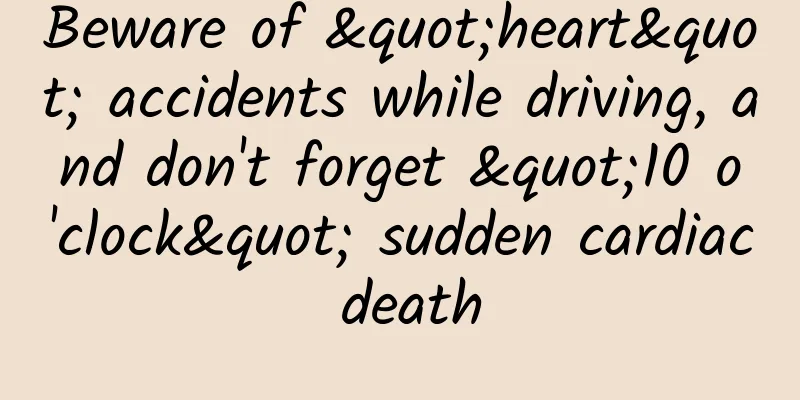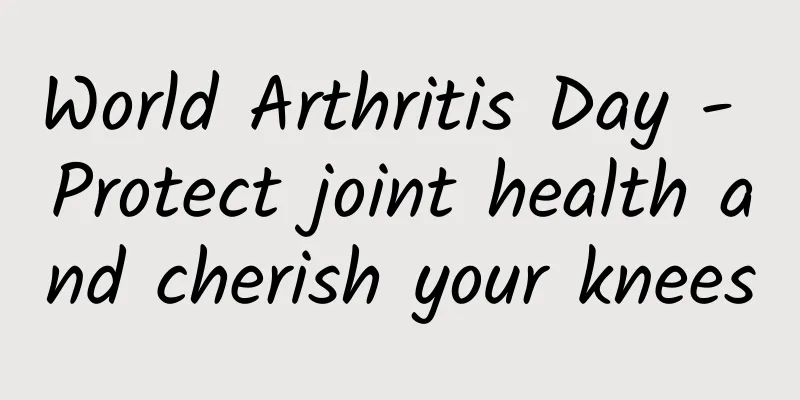Beware of "heart" accidents while driving, and don't forget "10 o'clock" sudden cardiac death

|
Recently, the sudden death of nationally renowned actors due to myocardial infarction has been reported in the newspapers. Among them, the sudden death of national first-class actor Chen Jianxiong due to myocardial infarction in the car has attracted particular attention... Because the fatigue and tension during driving can increase the myocardial oxygen demand and increase the burden on the heart, resulting in ischemia and hypoxia leading to myocardial infarction, and even sudden cardiac death. A research report shows that the probability of myocardial infarction in drivers is higher than that of other professions; today, when cars have become people's "mobile residences", while guarding against myocardial infarction accidents while driving, don't forget the myocardial infarction caused by the ten dangerous moments. We specially share the consensus on the ten dangerous moments of myocardial infarction we have released to fully understand this life-threatening serious disease and help people take timely precautions to avoid heart accidents at high-risk moments. 1. Toilet time Toilet time refers to the time when you go to the toilet. For middle-aged and elderly people or patients with diseases, defecation is often not smooth. When you forcefully defecate, the intra-abdominal pressure of the human body will increase, blood pressure will rise rapidly, and may even double compared to usual. The heart rate will also increase accordingly. All of this will increase the burden on the heart and may induce myocardial infarction (see Figure 1). It is recommended that patients with coronary heart disease or middle-aged and elderly people avoid exerting too much force when going to the toilet, and use drugs and other methods to assist defecation when defecation is not smooth. Figure 1 Toilet time. a. Potential hazards of toileting; b. Toilet suggestions 2. Bath time Bathing time refers to the time of bathing. When bathing, blood vessels throughout the body expand, and blood flow to the skin and muscles increases. Many elderly people have cardiovascular and cerebrovascular diseases. Staying in a closed oxygen-deficient environment for a long time can easily cause brain and heart ischemia, resulting in critical conditions. It is recommended that patients with coronary heart disease or middle-aged and elderly people should not bathe when they are full or hungry. The bathing water temperature should be equivalent to body temperature. The bathing time should not be too long, and it is best to do it with the help of others. See Figure 2. Figure 2 Bathing time. a. Potential dangers of bathing; b. Things to be careful about when bathing; c. Recommendations when bathing 3. Banquet time Banquet time refers to the time when you drink during a meal. Alcohol can cause brain excitement, increase heart rate, blood pressure, and induce arrhythmia, which increases the burden on the heart. Especially for patients with hypertension and cardiovascular and cerebrovascular diseases, drinking can induce coronary artery spasm and increase myocardial oxygen consumption, which can induce acute myocardial infarction; after patients with coronary artery disease eat a lot of high-fat and high-calorie food, the blood lipid concentration suddenly increases, resulting in increased blood viscosity, increased platelet aggregation, thrombosis, and acute myocardial infarction. It is recommended that patients with coronary heart disease or middle-aged and elderly people drink in moderation, and pay attention to a light diet, not overeating, to avoid increasing the burden on the heart. See Figure 3. Figure 3 Banquet time. a. Potential hazards of banquets; b. Things to note when having a banquet (1); c. Things to note when having a banquet (2); d. Things to note when having a banquet (3); e. Suggestions for having a banquet 4. Chess and card time Card time refers to the time spent sitting for a long time, such as playing cards or chess. If you are addicted to playing cards or sitting for a long time, once you suddenly get emotional, your blood pressure will soar, causing your heart rate to increase and your blood pressure to rise, which can easily induce myocardial ischemia and lead to tragedy. It is recommended that patients with coronary heart disease or the elderly should not sit for a long time. When playing cards or chess, etc., they should do some appropriate activities to promote smooth blood circulation in the body. See Figure 4. Figure 4: Time for playing chess and cards. a. Possible harms of playing chess and cards; b. Recommendations for playing chess and cards 5. TV time TV time refers to the time when people are easily emotionally excited, such as watching TV. Watching TV for a long time can cause excessive emotional excitement, sympathetic nerve excitement, increased catecholamines in the blood, increased blood pressure, coronary artery spasm, myocardial ischemia, and induce angina or myocardial infarction. It is recommended that patients with coronary heart disease or middle-aged and elderly people control the time they watch TV, do not watch TV for more than 30 minutes before going to bed, do not watch programs with overly stimulating content, maintain a calm state of mind, and avoid excessive joy leading to sorrow. See Figure 5. Figure 5 TV time. a. Possible harms of TV; b. Recommendations for watching TV 6. Swimming time Swimming time refers to the time of swimming. When swimming, the cold water can stimulate vasospasm, cause coronary ischemia and induce myocardial infarction. For the general population, swimming is a good way to exercise and can build a strong heart. However, heart disease patients are not suitable for swimming because swimming will increase the burden on the heart. It is recommended that healthy middle-aged and elderly people should fully exercise their bodies when swimming, and choose areas with suitable water temperature to avoid the stimulation of low water temperature; People with coronary heart disease should not blindly swim, but should exercise moderately after paying attention to medical examinations and evaluations. See Figure 6. Figure 6 Swimming time. a. Possible hazards of swimming; b. Recommendations for swimming 7. Smoking time Smoking time refers to the time when you smoke. Smoking can promote arteriosclerosis and increase the risk of myocardial infarction; at the same time, smoking can cause coronary artery contraction and spasm, leading to vascular occlusion and myocardial infarction. It is recommended that everyone realize that "smoking is harmful to health" and quit smoking as soon as possible, and believe that it is never too late to quit smoking. See Figure 7. Figure 7 Smoking time. a. Possible harm of smoking; b. Smoking advice 8. Living time Living time refers to the time when you get up in the morning. When you get up in the morning, you wake up from a "semi-dormant" state, your breathing and heartbeat speed up, your blood flow speeds up, and your blood pressure rises, which can easily cause ruptures in the aging cardiovascular and cerebrovascular systems, and thick blood can easily form blood clots and cause embolism. It is recommended that patients with coronary heart disease or middle-aged and elderly people keep warm when they get up in the morning, and avoid sitting up or getting out of bed suddenly. It is best to lie flat on the bed and move your limbs before sitting up slowly, moving your limbs, and then getting out of bed slowly. See Figure 8. Figure 8 Living time. a. Possible hazards of living time; b. Recommendations for living time 9. Snoring time Snoring time refers to the time when the snoring patient is in deep sleep. In fact, "snoring" is the most prominent characteristic manifestation of obstructive sleep apnea hypopnea syndrome, which is a highly prevalent disease with serious harm and potential danger. Repeated suffocation during sleep causes intermittent hypoxia of the whole body, increases the load on the heart, and causes sharp fluctuations in blood pressure, which can easily cause myocardial infarction. It is recommended that patients who snore when sleeping and suffer from obstructive sleep apnea hypopnea syndrome should be treated as soon as possible to eliminate risk factors. See Figure 9. Figure 9 Snoring time. a. Potential harm of snoring; b. Things to pay attention to when snoring (1); c. Things to pay attention to when sleeping soundly (2); d. Suggestions for sleeping soundly 10. Time of Great Compassion The time of great sorrow refers to the moment of extreme sadness when one is hit suddenly. Among the seven emotions and six desires of human beings, sadness is the most harmful to the heart. Once a person is in a state of great sorrow and cannot relieve it, the sympathetic nervous system will secrete a large amount of hormones, which will accelerate the heartbeat and constrict the arteries, leading to symptoms such as heartache, shortness of breath and shock, and causing greater tragedy. It is recommended that people with coronary heart disease or the middle-aged and elderly keep a balanced mentality, avoid excessive joy or sadness, and try to avoid sad occasions. See Figure 10. Figure 10 Great Compassion Time. a. Possible harms of Great Compassion; b. Suggestions for Great Compassion Time As the saying goes, "Don't be afraid of ten thousand, just be afraid of one." Patients with coronary heart disease should especially be aware of the main dangerous moments that may induce myocardial infarction—the "ten times" of going to the toilet, bathing, banquets, chess and card games, TV, swimming, smoking, living, snoring, and great sorrow. They should always keep these in mind in critical moments to prevent myocardial infarction and live happily in the world. In case of chest pain, a sense of impending death or oppression that lasts for 5 to 15 minutes or more, accompanied by sweating, nausea and other symptoms, be highly alert to the occurrence of myocardial infarction, call the emergency number immediately, and seek guidance and help from medical staff. If you have a history of coronary heart disease, you can take aspirin, nitroglycerin and other drugs to save yourself and others. Myocardial infarction is most likely to cause sudden death. At this time, it is necessary to keep the airway open and master cardiopulmonary resuscitation emergency techniques such as chest compression, abdominal lifting and pressure, and artificial respiration. It is recommended that abdominal compression cardiopulmonary resuscitation should be used when cardiac arrest occurs in patients with coronary stents or bypass surgery who have contraindications to chest compression. See Figure 11. Figure 11 Myocardial infarction. a. Symptoms of myocardial infarction; b. First aid for myocardial infarction; c. Resuscitation methods for cardiac arrest; d. Abdominal compression cardiopulmonary resuscitation method |
<<: Can high blood pressure cause eye diseases?
>>: Facebook research report released: most analysts are cautiously optimistic
Recommend
Cervical cauliflower growth
The cervix of women is most prone to inflammation...
How to prepare for the second child before pregnancy
Since the relaxation of the two-child policy, fam...
Banana vinegar diet has side effects, healthy weight loss is scientific
Banana is a fruit we often eat. It is rich in nut...
Can I wear slimming clothes during breastfeeding?
People with common sense know that pregnant women...
Oh my god, I was burned by a 40℃ hand warmer...
Tadpole Musical Notation original article, please...
What are the small lumps in the breast?
There are many people who suffer from breast dise...
Abnormally pale skin indicates seven signs of iron deficiency in women
1. Fatigue Blair Morris, an expert at the Vanderb...
How to abort a baby after one and a half months of pregnancy
There are not many major changes in the human bod...
More than 1 billion people in the world lack this vitamin! If this physical examination index is lower than 30, be careful!
When 26-year-old Xiao Zhang (pseudonym) got his p...
How long does it take for symptoms of ectopic pregnancy to appear?
How long does it take for symptoms of ectopic pre...
What to do about vaginal itching
We all know that many women have the problem of g...
Woman's lips turn purple
A pair of pink lips can greatly enhance a woman&#...
What to do if plain yogurt tastes too bad? How long is the shelf life of homemade yogurt?
Yogurt is a kind of milk product made from fresh ...
What should girls eat if they have severe hair loss?
There are many reasons for women's hair loss,...
Premenstrual chest pain definitely means you are not pregnant
Women should have a good life and diet routine, a...









![[Medical Q&A] Why do some people go to a smoking cessation clinic to quit smoking?](/upload/images/67f0fe13e42f5.webp)